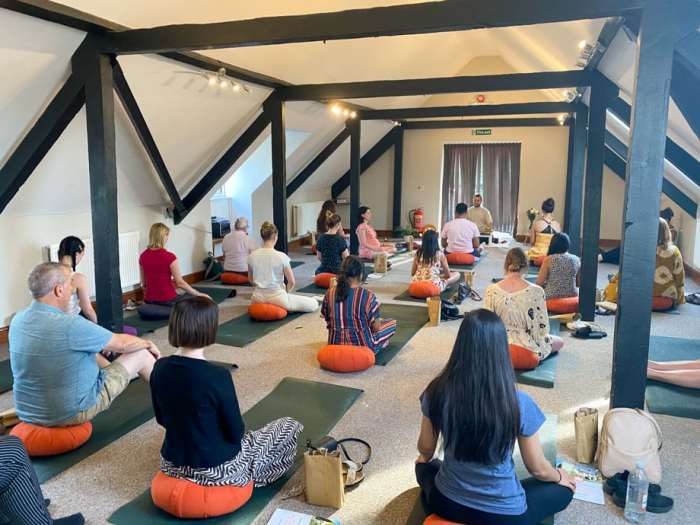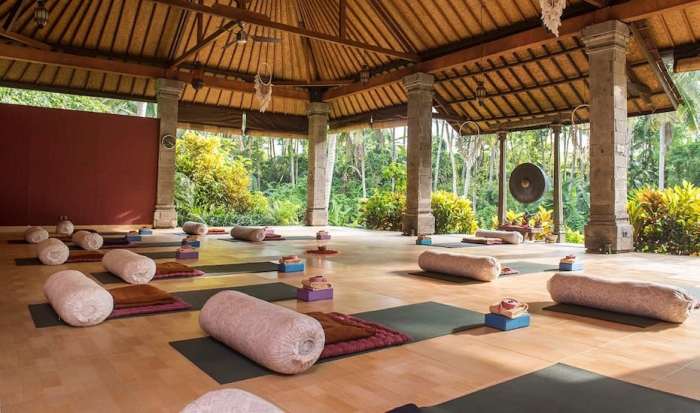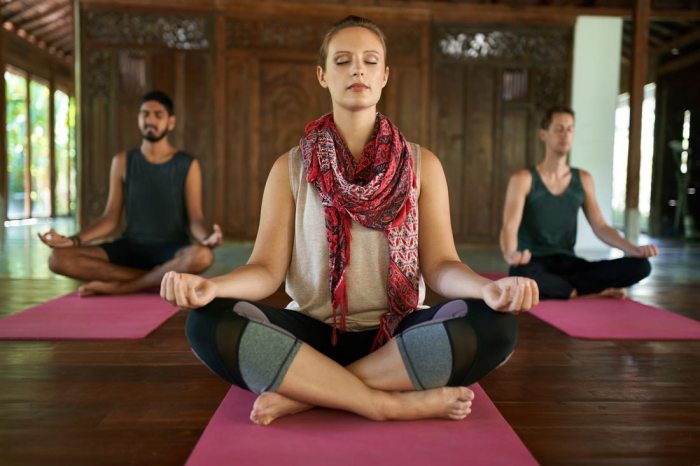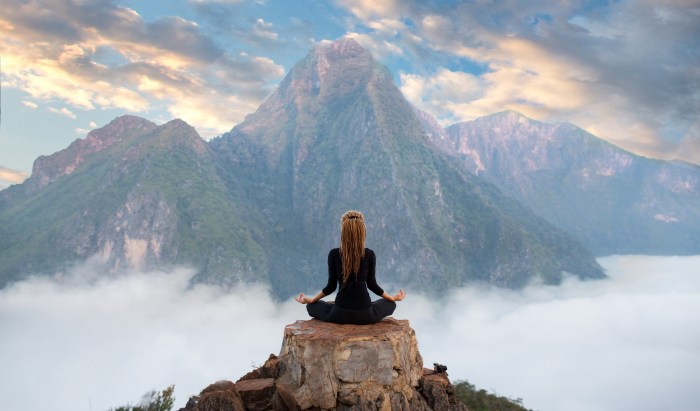Embark on a transformative experience with a meditation retreat, delving into the depths of inner peace and self-discovery. Discover the essence of mindfulness and relaxation in a serene setting that rejuvenates both mind and body.
Explore the various types of retreats, preparation essentials, daily schedules, benefits, challenges, and more in this comprehensive guide to meditation retreats.
What is a Meditation Retreat?

Source: org.uk
A meditation retreat is a structured period of time where individuals immerse themselves in various meditation practices in a peaceful and secluded environment. This retreat is designed to provide participants with a break from their daily routines and distractions, allowing them to focus on self-reflection, mindfulness, and personal growth.
The primary goal of attending a meditation retreat is to deepen one’s meditation practice, gain mental clarity, and cultivate a sense of inner peace. Participants are encouraged to disconnect from technology, social media, and other external stimuli to fully engage in the present moment and explore their inner thoughts and emotions.
Duration and Format
Typically, meditation retreats can range from a weekend getaway to several weeks in length, depending on the program and location. Retreats often follow a structured schedule that includes guided meditation sessions, silent contemplation periods, mindful movement practices like yoga or qigong, and teachings on various aspects of meditation and mindfulness.
Benefits of Participating
- Enhanced self-awareness and introspection
- Reduced stress and anxiety levels
- Improved focus and concentration
- Heightened sense of inner peace and contentment
- Opportunity for personal growth and self-discovery
Types of Meditation Retreats
There are various types of meditation retreats that cater to different preferences and practices. Each type offers a unique experience and focus, depending on the individual’s needs and goals.
Silent Retreats
Silent retreats are characterized by periods of complete silence, where participants refrain from speaking and focus on inner reflection. This type of retreat emphasizes solitude and introspection, allowing individuals to deepen their mindfulness practice without distractions.
Mindfulness Retreats
Mindfulness retreats focus on cultivating present moment awareness and acceptance. Participants engage in guided meditation practices, mindful movement, and mindful eating to develop a sense of clarity and presence in their daily lives. These retreats often incorporate teachings from the Buddhist tradition.
Nature-Based Retreats
Nature-based retreats offer participants the opportunity to connect with the natural world and harness its healing energies. These retreats take place in serene natural settings such as forests, mountains, or by the ocean, allowing individuals to practice meditation outdoors and immerse themselves in the beauty of nature.
Impact of Location and Setting
The location and setting of a meditation retreat can greatly influence the overall experience. A tranquil and serene environment can enhance focus and relaxation, while being surrounded by nature can foster a deeper sense of connection and grounding. Different settings offer unique opportunities for reflection and growth.
Popular Meditation Retreat Centers
- Spirit Rock Meditation Center – California, USA: A renowned center offering silent retreats and mindfulness-based programs in a serene natural setting.
- Plum Village – France: Founded by Thich Nhat Hanh, Plum Village is a Buddhist monastery known for its mindfulness retreats and teachings on engaged Buddhism.
- Tushita Meditation Center – India: Located in the Himalayas, Tushita offers retreats focused on Tibetan Buddhism and meditation practices.
Preparation for a Meditation Retreat

Source: cloudfront.net
Before embarking on a meditation retreat, proper preparation is essential to make the most of the experience and create a conducive environment for inner peace and reflection.
Essential Items Checklist
- Comfortable clothing: Loose and breathable outfits to allow for ease of movement and comfort during meditation.
- Yoga mat or cushion: To provide support and comfort during long periods of sitting or lying down.
- Water bottle: Staying hydrated is crucial for mental clarity and overall well-being.
- Journal and pen: To jot down thoughts, reflections, and insights during the retreat.
- Toiletries: Personal hygiene items to ensure cleanliness and freshness throughout the retreat.
- Snacks: Healthy and light snacks to keep energy levels up during breaks.
- Earplugs or eye mask: To block out distractions and create a peaceful environment for meditation.
Mental and Emotional Preparation
Before attending a meditation retreat, it is important to mentally and emotionally prepare yourself for the experience. Here are some tips to help you get ready:
- Set realistic expectations: Understand that meditation retreats can be challenging but ultimately rewarding.
- Practice mindfulness: Start incorporating mindfulness practices into your daily routine to prepare your mind for the retreat.
- Reflect on your intentions: Take some time to think about why you are attending the retreat and what you hope to gain from the experience.
- Stay open-minded: Approach the retreat with curiosity and openness to new experiences and teachings.
Setting Intentions or Goals
Setting intentions or goals for your meditation retreat can help guide your experience and focus your energy. It provides a sense of purpose and direction during the retreat. Consider what you wish to achieve, whether it’s finding inner peace, gaining clarity, or cultivating compassion.
Disconnecting from Technology and Distractions
One of the key aspects of a meditation retreat is disconnecting from technology and external distractions to fully immerse yourself in the present moment. Here are some tips to help you unplug during the retreat:
- Inform others: Let your friends and family know that you will be unavailable during the retreat.
- Set boundaries: Avoid using your phone or electronic devices unless absolutely necessary.
- Create a technology-free zone: Designate a specific area where technology is not allowed to ensure minimal distractions.
- Embrace silence: Use this opportunity to enjoy the peace and quiet without the constant buzz of notifications.
Daily Schedule and Activities

Source: myguide-cdn.com
At a meditation retreat, each day is carefully structured to provide a balance of meditation practice, learning, and personal reflection. The schedule is designed to help participants deepen their practice and cultivate mindfulness throughout the day.
Typical Daily Schedule
- Morning meditation session
- Breakfast
- Guided meditation or mindfulness workshop
- Walking or movement meditation
- Lunch and mindful eating practice
- Personal reflection time
- Afternoon meditation session
- Tea break
- Group discussion or Dharma talk
- Dinner
- Evening meditation session or chanting
Activities and Practices
- Meditation sessions: Both guided and silent meditation sessions are scheduled throughout the day to help participants deepen their practice.
- Workshops and discussions: Participants engage in learning activities and discussions to explore mindfulness and meditation concepts further.
- Mindful eating: Meal times are considered sacred and are practiced mindfully, focusing on each bite and the sensations of eating.
- Personal reflection: Participants have dedicated time for personal reflection, journaling, or walking meditation to connect with their inner selves.
- Communal activities: Group activities like Dharma talks, chanting, or tea breaks foster a sense of community and shared experience among participants.
Benefits and Challenges of Meditation Retreats

Source: success.com
Participating in a meditation retreat can offer a wide range of benefits for individuals seeking to deepen their practice and find inner peace. However, along with the benefits, there are also common challenges that participants may face during the retreat. Personal experiences and testimonials often highlight the transformative effects of attending a meditation retreat and how the lessons learned can be integrated into daily life post-retreat.
Potential Benefits of Meditation Retreats
- Deepening your meditation practice and experiencing profound states of mindfulness.
- Gaining clarity and insight into your thoughts, emotions, and behaviors.
- Disconnecting from the distractions of daily life and finding inner peace and relaxation.
- Developing a sense of community and support with like-minded individuals on the same journey.
- Exploring new techniques and teachings that can enhance your meditation practice.
Common Challenges During Meditation Retreats
- Physical discomfort from sitting for long periods of time or adjusting to a new routine.
- Mental resistance or facing unresolved emotions and thoughts that arise during meditation.
- Struggles with maintaining focus and concentration during meditation sessions.
- Feelings of isolation or loneliness, especially for those attending retreats alone.
- Navigating interpersonal dynamics and conflicts within the retreat environment.
Transformative Effects of Meditation Retreats
- Increased self-awareness and emotional regulation in daily life.
- Enhanced ability to cope with stress, anxiety, and challenges in a more mindful way.
- Improved overall well-being, mental clarity, and sense of purpose.
- Stronger connection to oneself and others, fostering more meaningful relationships.
- Integration of mindfulness practices into daily routines for long-lasting benefits.
Wrap-Up

Source: mypressplus.com
As we conclude this exploration of meditation retreats, remember that the journey to self-awareness and tranquility continues long after the retreat ends. Embrace the learnings and experiences to cultivate a harmonious balance in your everyday life.